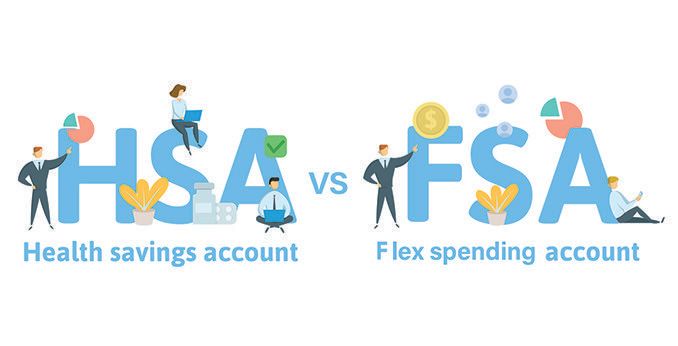7 Best Comparisons: Health Savings Accounts Vs Flexible Spending Accounts

Are you trying to decide between a health savings account (HSA) and a flexible spending account (FSA)? Look no further!
This article will provide you with the top 7 comparisons to help you make an informed decision.
Learn about the tax advantages, contribution limits, eligibility requirements, roll-over and carry-over options, withdrawal flexibility, investment opportunities, and employer contribution options.
By the end, you’ll have all the information you need to choose the best option for your healthcare needs.
Key Takeaways
- HSAs offer triple tax benefits, while FSAs provide tax advantages through pre-tax contributions.
- HSAs have account portability and more flexible withdrawal options compared to FSAs.
- Contribution limits for HSAs and FSAs can change annually, so it’s important to carefully consider your healthcare needs.
- Documentation requirements and roll-over/carry-over options vary between HSAs and FSAs, with HSAs allowing roll-over of unused funds and FSAs offering carry-over options up to a certain limit.
Tax Advantages
When it comes to tax advantages, you’ll find notable differences between Health Savings Accounts (HSAs) and Flexible Spending Accounts (FSAs).
HSAs offer triple tax benefits: contributions are tax-deductible, earnings grow tax-free, and withdrawals for qualified medical expenses are also tax-free.
On the other hand, FSAs provide tax advantages through pre-tax contributions, meaning you don’t pay taxes on the money you contribute to the account. However, withdrawals from FSAs are subject to strict rules and restrictions.
Unlike HSAs, FSAs have a ‘use it or lose it’ policy, where any remaining funds at the end of the year are forfeited.
Additionally, HSAs offer account portability, allowing you to take your funds with you if you change jobs or insurance plans. FSAs, on the other hand, don’t provide this flexibility.
Contribution Limits
To maximize your savings, it’s important to understand the contribution limits for both Health Savings Accounts (HSAs) and Flexible Spending Accounts (FSAs).
When it comes to contribution limits, HSAs offer more flexibility compared to FSAs. For 2021, the maximum annual contribution limit for an individual with self-only coverage is $3,600, while for individuals with family coverage, it’s $7,200. On the other hand, FSAs have a maximum contribution limit of $2,750 per year.
It’s important to note that these contribution limits are subject to change each year. Understanding the contribution limits is crucial because exceeding the limit may result in penalties or disqualification from certain benefits.
Therefore, carefully consider your healthcare needs and compare the benefits of HSAs and FSAs when deciding on the appropriate contribution amount.
Eligibility Requirements
When it comes to eligibility requirements, there are a few key points to consider.
First, income limitations may determine whether or not you qualify for either a Health Savings Account (HSA) or a Flexible Spending Account (FSA).
Additionally, it’s important to note that HSAs are typically employer-sponsored, while FSAs can be either employer-sponsored or individual.
Lastly, both types of accounts require documentation for reimbursement, so be sure to keep track of your expenses and follow the necessary steps for reimbursement.
Income Limitations for Eligibility
To qualify for either a Health Savings Account or a Flexible Spending Account, it’s crucial to meet specific income limitations. These income limits are set to ensure that these accounts are primarily accessible to those who truly need financial assistance in managing their healthcare expenses. Eligibility requirements for both types of accounts vary, but generally, the income limits are determined based on your tax filing status and adjusted gross income.
It’s important to note that these income limits can change annually, so it’s essential to stay updated with the latest guidelines. By meeting the income limitations, you can take advantage of the benefits offered by Health Savings Accounts and Flexible Spending Accounts, such as tax advantages and the ability to save for medical expenses.
Employer-Sponsored Account Options
You can determine your eligibility for employer-sponsored account options by reviewing the specific requirements set by your employer. Here are three important aspects to consider when evaluating your eligibility:
- Employer Contribution Options: Some employers offer matching contributions to their employees’ health savings accounts (HSAs) or flexible spending accounts (FSAs). It’s important to review your employer’s contribution options to understand the potential benefits and how they can help you save money for your healthcare expenses.
- Investment Opportunities: HSAs often provide investment options, allowing you to grow your savings over time. These investment opportunities can help you maximize the returns on your contributions and build a more substantial healthcare fund for the future. Make sure to check if your employer’s HSA offers investment options and consider taking advantage of them if available.
- Account Maintenance Requirements: Employers may have certain requirements for maintaining and managing your HSA or FSA. These requirements can include regular contributions, account balance thresholds, or specific documentation for reimbursable expenses. Understanding these requirements will help you effectively utilize your employer-sponsored account options and avoid any potential penalties or limitations.
Documentation Requirements for Reimbursement
To be eligible for reimbursement, you must provide the necessary documentation for your healthcare expenses. The reimbursement process requires you to submit the required documentation, such as receipts, invoices, and explanation of benefits (EOBs), to your health savings account (HSA) or flexible spending account (FSA) provider.
These documents serve as proof that the expenses are qualified medical expenses and are eligible for reimbursement. It’s essential to keep track of all your healthcare expenses and ensure that you have the required documentation to support your reimbursement claims. Without the proper documentation, your reimbursement request may be denied.
Therefore, it’s crucial to familiarize yourself with the specific documentation requirements of your HSA or FSA provider to ensure a smooth reimbursement process.
Roll-Over and Carry-Over Options
When comparing Health Savings Accounts (HSAs) and Flexible Spending Accounts (FSAs), it’s important to consider the roll-over and carry-over options available. These options determine what happens to any unused funds at the end of the year.
Here are three key points to consider:
- Roll-over options: HSAs allow you to roll over unused funds from year to year without any penalty. This means that any money left in your HSA at the end of the year will still be available for future healthcare expenses.
- Carry-over options: On the other hand, FSAs typically have a use-it-or-lose-it policy, where any unused funds are forfeited at the end of the year. However, some FSAs offer a carry-over option, allowing you to carry over a portion of unused funds into the following year, usually up to a certain limit.
- Flexibility: HSAs provide more flexibility when it comes to roll-over options, giving you the ability to save and accumulate funds over time. FSAs, on the other hand, may have more limited carry-over options, but they still offer some flexibility to carry over a portion of unused funds.
Considering these roll-over and carry-over options is crucial in determining which account best suits your needs and financial goals.
Withdrawal Flexibility
When it comes to withdrawal flexibility, there are several key points to consider.
Firstly, the tax implications of both HSAs and FSAs differ, with HSAs offering tax advantages that FSAs do not.
Secondly, HSAs allow for rollover options, meaning any unused funds can be carried over to the next year, while FSAs typically have a ‘use it or lose it’ policy.
Lastly, it’s important to compare the eligible expenses for each account type, as this can impact your ability to withdraw funds for certain medical expenses.
Tax Implications: HSA Vs FSA
You can easily compare the tax implications of Health Savings Accounts (HSAs) and Flexible Spending Accounts (FSAs) by looking at their withdrawal flexibility. Here are three key points to consider:
- HSA withdrawals for qualified healthcare expenses are tax-free: With an HSA, you can withdraw funds tax-free as long as you use them for eligible medical expenses. This can provide significant tax savings.
- FSA withdrawals are also tax-free but with a use-it-or-lose-it rule: FSAs also offer tax-free withdrawals for eligible healthcare expenses. However, it’s important to note that unused funds in an FSA generally can’t be carried over to the following year, so it’s crucial to estimate your expenses accurately.
- HSA funds can be invested and grow tax-free: Unlike an FSA, an HSA allows you to invest your funds, and any earnings are tax-free. This means your HSA balance has the potential to grow over time, providing even greater tax advantages.
Understanding the tax implications of HSAs and FSAs can help you make informed decisions about managing your healthcare expenses.
Rollover Options: HSA Vs FSA
To continue the comparison between Health Savings Accounts (HSAs) and Flexible Spending Accounts (FSAs), let’s now explore the rollover options for each account, specifically focusing on their withdrawal flexibility. Rollover benefits and account expiration are important factors to consider when deciding between an HSA and an FSA.
Here’s a table summarizing the key differences:
| HSA | FSA | |
|---|---|---|
| Rollover Benefits | Unused funds roll over | Limited rollover options |
| Account Expiration | No expiration date | Funds must be used by year-end |
| Withdrawal Flexibility | Can withdraw funds for qualified medical expenses at any time | Must use funds before the end of the plan year or within a grace period |
With an HSA, any unused funds can be rolled over from year to year, allowing you to accumulate savings for future healthcare expenses. Additionally, there is no expiration date for HSA funds, giving you more flexibility and peace of mind.
On the other hand, FSAs have more limited rollover options. Typically, any remaining funds in an FSA must be used by the end of the plan year or within a grace period. This means you need to carefully plan your expenses to avoid losing any money.
When it comes to withdrawal flexibility, HSAs allow you to withdraw funds for qualified medical expenses at any time. This can be especially beneficial in emergency situations. However, with FSAs, you must use the funds before the end of the plan year or within a grace period, limiting your flexibility and potentially causing you to lose money if you don’t use it in time.
Eligible Expenses: HSA Vs FSA
Moving on to the discussion of eligible expenses and withdrawal flexibility between Health Savings Accounts (HSAs) and Flexible Spending Accounts (FSAs), let’s now delve into the specifics.
Here is a comparison of eligible expenses for both accounts:
- HSA Eligible Expenses: With an HSA, you can use your funds to pay for a wide range of medical expenses, including doctor’s visits, prescription medications, hospital stays, and even certain dental and vision expenses. The IRS provides a comprehensive list of eligible expenses that you can refer to for guidance.
- FSA Eligible Expenses: FSAs also cover a variety of medical expenses, such as doctor’s visits, prescription drugs, and medical supplies. However, it’s important to note that FSAs may have more restrictions on what expenses are eligible compared to HSAs. You should consult your FSA plan documents or speak with your employer for a detailed list of eligible expenses.
- Reimbursement Documentation: Both HSAs and FSAs require proper documentation for reimbursement. Keep track of your receipts, invoices, and other relevant documentation to substantiate your expenses. This documentation is crucial for both accounts to ensure compliance with IRS regulations.
Investment Opportunities
When considering investment opportunities, it’s important to compare the options available for health savings accounts and flexible spending accounts.
Both accounts offer potential investment opportunities, but they differ in terms of withdrawal flexibility.
Health savings accounts (HSAs) allow you to invest your funds and grow them tax-free, providing an opportunity to build savings for future medical expenses. Additionally, HSAs offer the flexibility to withdraw funds for eligible medical expenses at any time, without penalty.
On the other hand, flexible spending accounts (FSAs) don’t allow for investment opportunities. While they do offer the advantage of pre-tax contributions and tax-free withdrawals for eligible expenses, any unused funds at the end of the year are forfeited.
Therefore, if investment opportunities and withdrawal flexibility are important to you, an HSA may be the better choice.
Employer Contribution Options
Your employer has various options for contributing to both health savings accounts (HSAs) and flexible spending accounts (FSAs).
Here are three ways your employer can contribute to these employer-sponsored plans:
- Contribution Matching: Some employers offer contribution matching, where they match a certain percentage of your contributions to the account. For example, if you contribute $100 to your HSA or FSA, your employer may match that with an additional $100, effectively doubling your savings.
- Fixed Contribution: Another option is for your employer to make a fixed contribution to your HSA or FSA. This means that they contribute a set amount to your account regardless of your own contributions. This can be a helpful way to kickstart your savings.
- Gradual Increase: Some employers choose to gradually increase their contributions to your HSA or FSA over time. This can be a great incentive to encourage you to save more and take advantage of the benefits of these accounts.
Frequently Asked Questions
Can I Use My Health Savings Account (Hsa) or Flexible Spending Account (Fsa) Funds to Pay for Over-The-Counter Medications?
Yes, you can use your HSA or FSA funds to pay for over-the-counter medications. There is no limit on how much you can contribute to your HSA, but FSA contributions are limited.
Are There Any Penalties for Withdrawing Funds From My HSA or FSA for Non-Medical Expenses?
You may face penalties for withdrawing funds from your HSA or FSA for non-medical expenses. Additionally, there are tax implications associated with these withdrawals. It’s important to consider these factors before making any non-medical withdrawals.
Can I Have Both an HSA and an FSA at the Same Time?
Yes, you can have both an HSA and an FSA at the same time. Having both offers the benefits of tax advantages and flexibility for medical expenses. However, remember to compare contribution limits for each account.
Can I Use My HSA or FSA Funds to Pay for Dental or Vision Expenses?
Yes, you can use your HSA or FSA funds to pay for dental expenses such as cosmetic procedures. You can also use them for vision expenses like prescription eyeglasses.
Are There Any Restrictions on Using HSA or FSA Funds for Alternative Healthcare Treatments, Such as Acupuncture or Chiropractic Services?
There may be restrictions on using HSA or FSA funds for alternative healthcare treatments like acupuncture or chiropractic services. Check with your provider for coverage details and reimbursement process.









